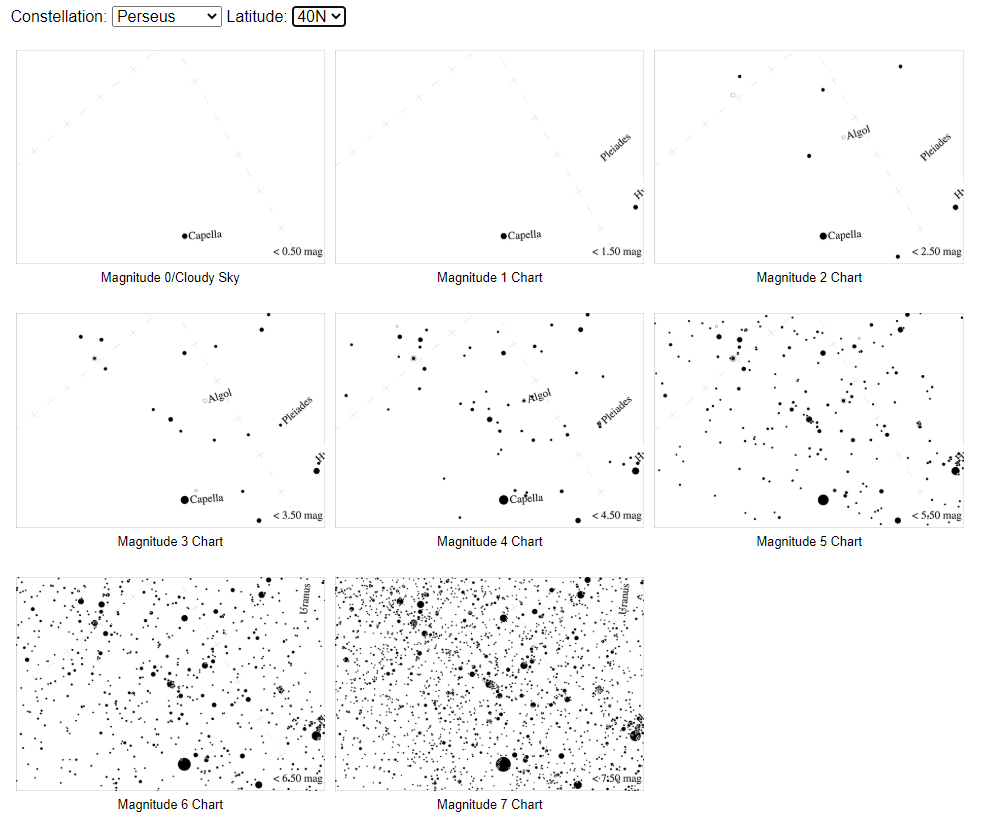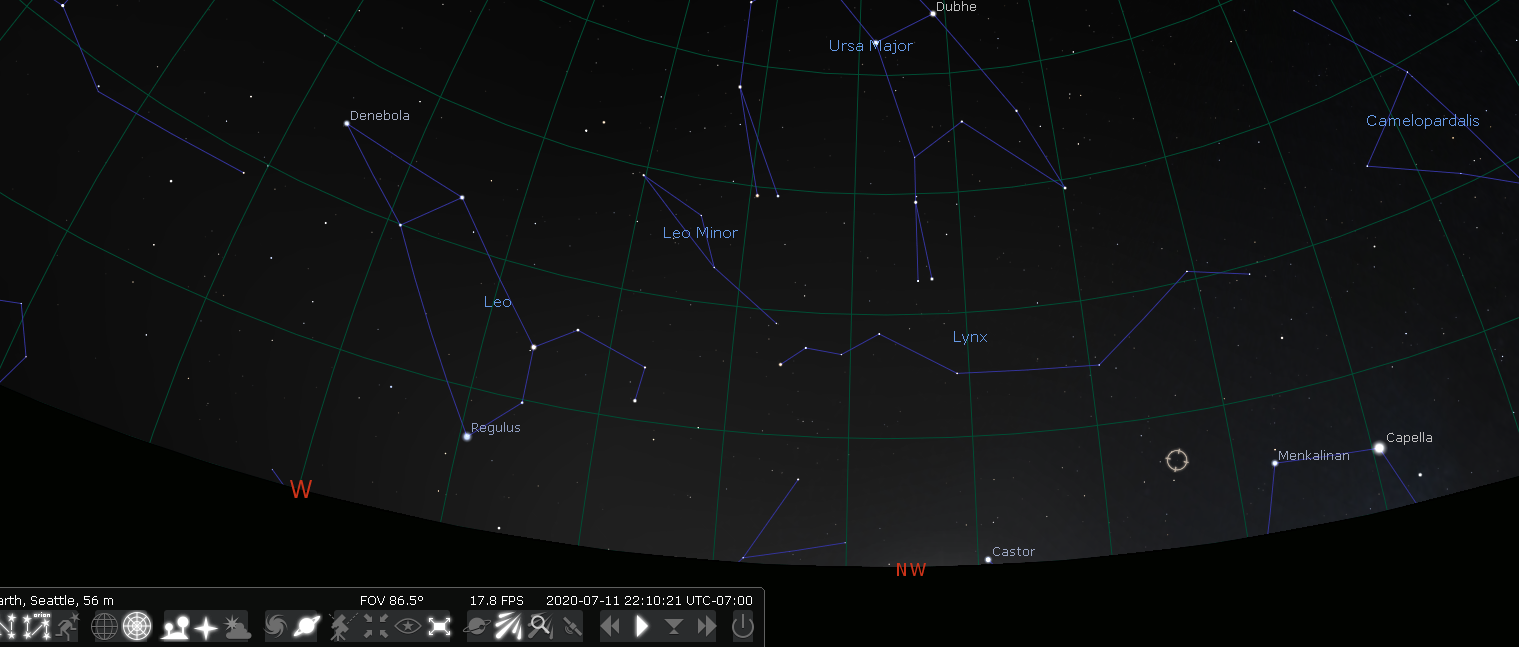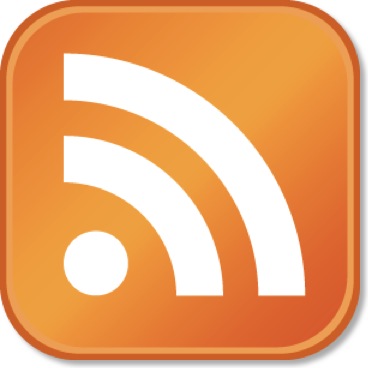 Comet NEOWISE (C/2020 F3) from West Seattle
Comet NEOWISE (C/2020 F3) from West Seattle
This comet is visible a couple hours before sunrise for the next few days (July 9, 10, 11) and shortly after sunset after July 12 or so. All dates and times I mention are for West Seattle, Washington, USA. We’re in Pacific Time and at latitude 47.5°. Most of the times will be approximately true for your local time if you’re between 30-50° latitude in the Northern Hemisphere.
The problem with Comet NEOWISE is, even though it is fairly bright for a comet, it is still very close to the Sun from our point of view. When the Sun is in the sky, or even not in the sky but near the horizon, the sky itself is bright, washing out dimmer stars and sky objects. So you have to find the balance point between the peak of the comet’s brightness (which seems to be today July 9) and its distance from the Sun in the sky. Starting July 12 it will get farther and farther from the Sun in our sky, and be visible later and later after sunset.
NEOWISE is currently approximately visual magnitude 2 (smaller numbers are brighter), which is easily visible in a semi-dark sky. You can use these star charts to estimate whether or not a magnitude 2 object will be visible where you are. If you can see as many stars as are in the magnitude 3 chart, or more, then the comet will be visible. If you’re reading this after July 10, check the current magnitude of the comet, and look for the chart for stars dimmer than that.

Image from Globe at Night
Morning Sky
Your best chance for July 10 and July 11, 2020 will be around 3-3:40 am looking towards the Northeastern horizon.

Image from Stellarium
The Northeast horizon is our worst horizon in West Seattle, because that’s directly over Seattle proper. Lots of light pollution. If you want to see this comet, you’ll have to go to the other side of the city. Consider the peninsula or the East side of the Cascades. Wherever you choose, please wear a mask and stay more than 6 feet away from stargazers who aren’t part of your household.
Evening Sky
In a few days, after July 12, it will start to be visible after the Sun sets. You’re welcome to try for it before July 12, but since it sets just an hour after sunset, the odds aren’t good. You’ll be looking north of the Northwest horizon.

Image from Stellarium
This is a much better horizon from West Seattle, you can view it from most place on the West side of West Seattle. I recommend trying for this one starting July 12 or so, and watch the news to see if other Northern Hemisphere folks have sighted it in their evening skies yet. Wherever you choose, please wear a mask and stay more than 6 feet away from stargazers who aren’t part of your household.
Binoculars
STOP! READ THIS!
If you use binoculars to see this, you must promise me you’ll put them down about 20 minutes before sunrise is predicted to happen. Please. This object is too close to the Sun for me to risk your eyes. Similarly, don’t begin looking for it until at least 5 minutes after you see the Sun finally set below the horizon.
This comet is going to be much more spectacular in binoculars or if you take a long-exposure photograph. A number of phones have “night sight” settings in the camera now, that will also bring out a little more detail, but you’ll need to hold the phone still: rest it on a stable surface.
Any old binoculars will work, they don’t need to be specific to astronomy.
Some useful sources:
- Sky and Telescope has a map of NEOWISE’s positions over the course of July, and some photos by amateur astronomers.
- Globe at Night has some reference star charts so you know how bright the stars are that you’re able to see.
- Earth and Sky has tips on comet viewing, and the picture from Alexander Krivenyshev in Guttenberg, New Jersey is the most like what you’ll see.
- Aerith.net by Seiichi Yoshida is full of detailed information about this comet, along with its most recent brightness.
Keep Looking Up!
-Alice





Thanks Alice for writing this! I found a link to this from the west seattle blog and was able to show my daughters the wonders of a comet. Super exciting. We saw it in the evening after sunset around 11pm. Also managed to get a few pictures.
I was wondering what time today sat July 18 and July 19 will the comet be visible from west Seattle ?
And what location in the sky
Thank you